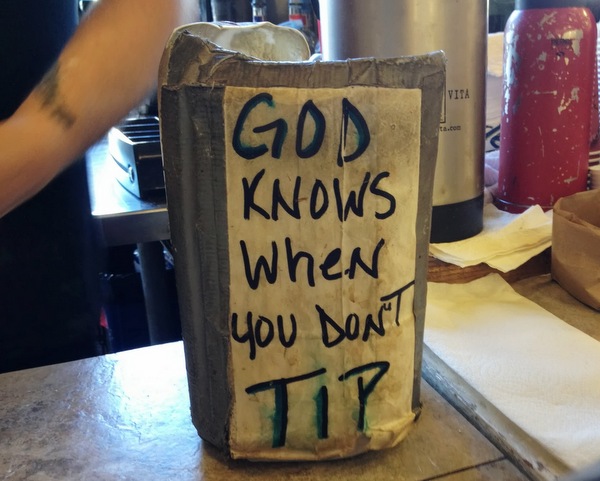Deadbeats. Gate lice. Entitleds.
Pull back the curtain on the service industry and you can hear them talking about us -- often in unflattering terms.
Being tagged as a terrible customer can be embarrassing. Consider the lousy tippers database, which outs customers who have the gall to pay the menu price for their meals, minus a gratuity. Being a bad tipper can have real consequences. Just ask Drew Brees, who, as it turns out, is not a bad tipper.
But did anyone bother to tell us what being a "good" customer means? That's not always clearly disclosed. Maybe it should be.
You don't have to yell
Consider my recent run-in with a little rule called NRS 463.350. If you've never heard of NRS 463.350, you're not alone. Neither had I when I tried to walk through a Las Vegas casino with my family on our way to a bus tour. In Sin City, there's really no way to avoid walking through a smoke-filled gaming floor if you want to get anywhere. You hold your breath and walk fast.
NRS 463.350 is a Nevada statute that says minors aren't allowed to loiter on the casino floor. It's a law I wholeheartedly agree with, but was unaware of when we stopped at a gift store to buy a bottle of water.
This particular casino is very upscale and enjoys a reputation for delivering excellent service. But, apparently, waiting for Mom to buy a beverage with an 11-year-old is considered loitering.
"You can't be here!" an employee barked at me. "You have to move now."
Had I known about NRS 463.350, I certainly wouldn't have stopped.
But yelling at a guest? Unless there's a fire in the hotel, I can't think of any reason to do it.
Had the employee said, "I'm sorry, but Nevada state law doesn't allow minors to stop in the casino," then I might have felt a little better. When were they planning to tell me the kids couldn't stop to marvel at the slot machines?
Point is, with just a few carefully-chosen words, the employee wouldn't have made me wish I'd never set foot in the futuristic-looking casino with a backward view of customer service.
We're not invisible
A few days later, I had another fascinating conversation with an off-duty bartender in California. During a frank discussion about the tipping economy, she told me that on a good evening she raked in $600 in gratuities, which she didn't have to declare as income to the government. But she added that customers who didn't tip "at least 20 percent" were her pet peeves.
"What happens if you fail to observe this invisible rule?" I asked.
"Unless you're the only person at the bar," she said, "you're invisible to me. You don't exist."
OK, I'm on record as being the world's worst tipper, which is why I always ask someone else to calculate the tip. I feel that the price that's on the menu is the price I should pay. If you want 20 percent more, then why not add 20 percent to the menu and be done with it?
But beyond that, I wonder what happens when someone from Europe walks into the bar and isn't aware that "at least" 20 percent is expected. Do they also become "invisible"?
This isn't the time to argue about the ethics of paying your employees below minimum wage and forcing them to rely on the kindness of strangers to earn a living. I'll save that for another post. But I'm hard-pressed to recall the last time my menu said, "YOU ARE EXPECTED TO TIP 20 PERCENT," or even, "Prices do not include gratuity."
There's no guidance, no disclosure.
As a result, employees are often furious at us. In the airline industry, for example, employees have a rich vocabulary to describe passengers that behave inappropriately, starting with the simple word "pax" (an abbreviation of passengers) and ranging to the derogatory term "gate lice" for inexperienced air travelers making rookie mistakes. They also call people who ought to know better, because of the color of their frequent flier card, "entitleds."
So how can we be good customers if no one knows how they're supposed to behave? The casino should have told us about the kids-standing-still rule by prominently posting it outside the entrance. It did not.
My friend's bar should inform patrons that they depend on tips to pay the rent. Or, they might start by printing a little notification at the bottom of our bills:
Prices do not include customary 20 percent gratuity."
I spend a lot of time on this site telling companies how to behave. Maybe it's time they let us know what's expected of us, too.
After you've left a comment here telling me that if I can't figure out how to tip, I shouldn't be eating in a restaurant (oh, that's a new one!), let's continue the discussion on my consumer advocacy site or on Twitter, Facebook and Google. I also have a free newsletter and you'll definitely want to pre-order my new, amazingly helpful and subversive book called How to Be the World's Smartest Traveler (and Save Time, Money, and Hassle).
